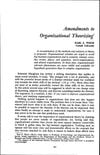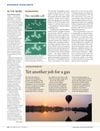 23 citations,
December 2004 in “Differentiation”
23 citations,
December 2004 in “Differentiation” Sex hormones affect hair and feather growth and may help manage alopecia and hormone-dependent cancers.
 15 citations,
September 2015 in “Journal der Deutschen Dermatologischen Gesellschaft”
15 citations,
September 2015 in “Journal der Deutschen Dermatologischen Gesellschaft” Skin doctors should recognize and treat conditions like hair-pulling and skin-picking early, often using therapy and medication, to help 50-70% of patients.
 8 citations,
June 2020 in “Dermatologic Therapy”
8 citations,
June 2020 in “Dermatologic Therapy” Hair loss lowers quality of life, causing embarrassment, frustration, and sexual rejection.
 6 citations,
November 2018 in “Journal of Critical Care”
6 citations,
November 2018 in “Journal of Critical Care” Many survivors of critical illness, especially those with sepsis, experience hair loss.
 5 citations,
February 2013 in “Dermatology and therapy”
5 citations,
February 2013 in “Dermatology and therapy” Crescina® lotion helps reduce hair loss and increase hair growth in males with androgenetic alopecia.

Afro-textured hair is more fragile and prone to certain scalp conditions, requiring careful treatment and more research for effective management.
 2 citations,
January 2019 in “International journal of medicine in developing countries”
2 citations,
January 2019 in “International journal of medicine in developing countries” Many people in Majmaah city, Saudi Arabia, don't know much about vitamin D deficiency and don't practice good vitamin D habits, with few linking it to hair loss.
 2 citations,
September 1974 in “Academy of Management Journal”
2 citations,
September 1974 in “Academy of Management Journal” Karl E. Weick recommended focusing on everyday events and smaller organizations to improve organizational theory.
 1 citations,
September 2019 in “Practica medicală”
1 citations,
September 2019 in “Practica medicală” Hair loss is linked to heart disease and metabolic syndrome, and while current treatments vary in effectiveness, more research is needed for better solutions.

Researchers found a genetic link for hereditary hair loss but need more analysis to identify the exact gene.
 January 2017 in “Acta dermato-venereologica”
January 2017 in “Acta dermato-venereologica” The congress showed that psychological therapy can help skin condition patients, social media affects acne stigma, education improves atopic dermatitis, and patient satisfaction in dermatology is high, especially with good doctor engagement.
 October 2000 in “Annals of Dermatology”
October 2000 in “Annals of Dermatology” Finasteride effectively treats hair loss in men with minimal side effects.
 August 2002 in “Zeitschrift für Hautkrankheiten”
August 2002 in “Zeitschrift für Hautkrankheiten” Female pattern hair loss affects crown, increases with age, and has limited treatments.
 5 citations,
January 2020 in “The mental health clinician”
5 citations,
January 2020 in “The mental health clinician” Vitamin D supplements may reduce hair-pulling in people with Trichotillomania.
5 citations,
January 2016 in “Open Journal of Regenerative Medicine” Myoblast transplantation shows promise for treating various muscle and heart conditions.
2 citations,
April 2022 in “Genes” The study found that the hair loss condition in Cesky Fousek dogs is influenced by multiple genes affecting skin and muscle structure, fat metabolism, and immunity.
2 citations,
July 2021 in “Genes” A specific genetic change in the KRT71 gene causes a hair loss condition in Hereford cattle.
1 citations,
January 2019 in “Journal of Research in Medical Sciences” Fewer GGC sequences in the androgen receptor gene improve finasteride treatment for hair loss.
 July 2023 in “Deleted Journal”
July 2023 in “Deleted Journal” Androgenetic alopecia is more common in Saudi men than women.
 2 citations,
August 2022 in “Reproductive Biology and Endocrinology”
2 citations,
August 2022 in “Reproductive Biology and Endocrinology” Magnesium supplements improved quality of life for women with polycystic ovary syndrome, but didn't help with acne, hair loss, or abnormal bleeding.
 1 citations,
January 2023 in “Nutrients”
1 citations,
January 2023 in “Nutrients” Drinking lots of sugary drinks may increase the risk of hair loss in young men.
March 2022 in “IntechOpen eBooks” PCOS affects many aspects of health, not just fertility, and needs comprehensive treatment.
 15 citations,
August 2017 in “Scientific Reports”
15 citations,
August 2017 in “Scientific Reports” Young men with early hair loss have slightly worse blood sugar and fat levels, suggesting possible health risks and need for monitoring.
 18 citations,
January 1998 in “Endocrine”
18 citations,
January 1998 in “Endocrine” RU58841, a nonsteroidal anti-androgen, showed potential as a topical treatment for hair loss, increasing hair density, thickness, and length without systemic side effects in Stumptailed Macaques.
 51 citations,
January 1989 in “Journal of Investigative Dermatology”
51 citations,
January 1989 in “Journal of Investigative Dermatology” Men with male-pattern baldness have more androgen receptors in their scalp's oil glands, which may contribute to hair loss.
 3 citations,
April 2011 in “Expert Review of Dermatology”
3 citations,
April 2011 in “Expert Review of Dermatology” Male hair loss is caused by inactive hair follicle stem cells.
 October 2005 in “Nature reviews. Molecular cell biology (Print)”
October 2005 in “Nature reviews. Molecular cell biology (Print)” Hairless protein is key for hair growth, cell differences cause gene expression variation, and the N-end rule pathway senses nitric oxide for protein breakdown.
 35 citations,
January 2000 in “Dermatology”
35 citations,
January 2000 in “Dermatology” Hair loss common in Norwegian men, affecting self-esteem and life quality.
 19 citations,
November 2011 in “Journal of Dermatological Science”
19 citations,
November 2011 in “Journal of Dermatological Science” TGF-β1 increases androgen receptor activity in hair loss, but Hic-5/ARA55 can counter this effect.
 10 citations,
August 2020 in “Journal of Bioscience and Bioengineering”
10 citations,
August 2020 in “Journal of Bioscience and Bioengineering” Platelet-rich plasma can potentially improve hair regeneration by increasing follicular gene expression and hair growth activity.

























